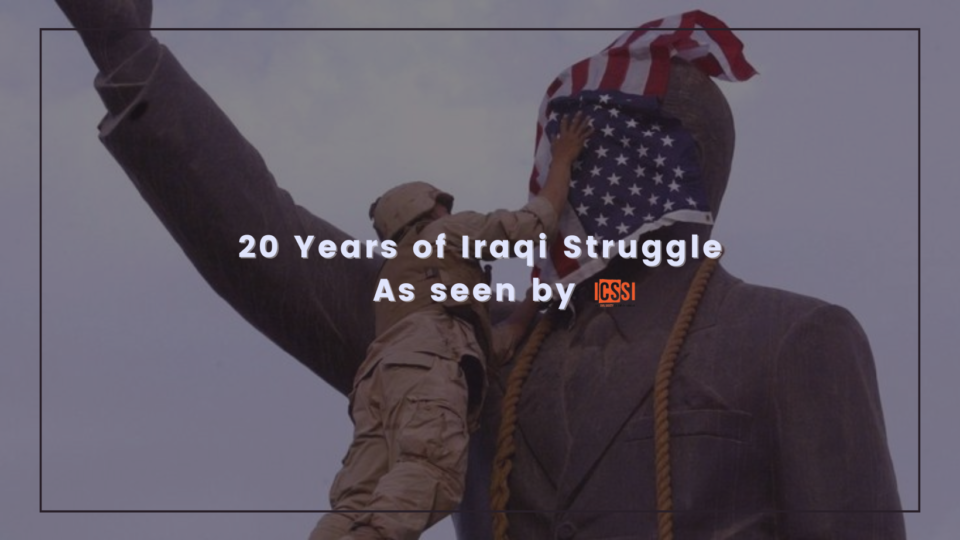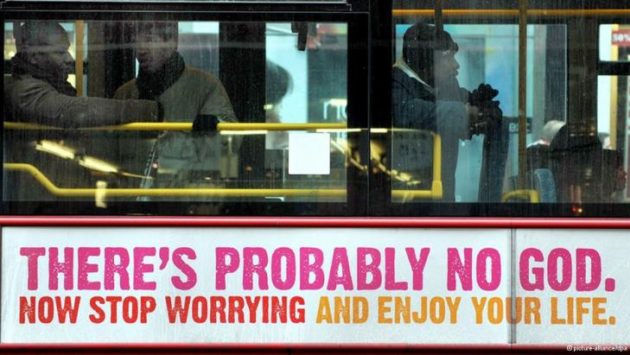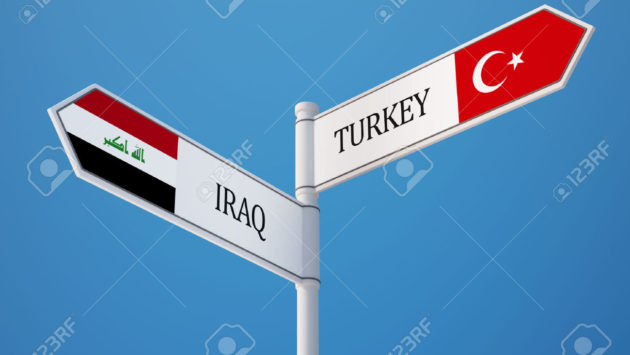20 years of Iraqi Struggle
What happened after the invasion, in the eyes of ICSSI.
On March 19th, 2003, the sound of sirens and bombs echoed throughout the provinces of Iraq, as the U.S. launched their military operation named “Iraqi Freedom”, under the command of president George Bush, starting with the invasion of federal Iraq, with an aim to decide its new political system. This invasion was justified under the excuse that Iraq was in possession of weapons of mass destruction (WMD’s).
This invasion was preceded by a Massive International anti-war demonstration, urging the decision makers to employ nonviolent means to achieve the change they desired.
This international reaction was a result of many things, as our dear ICSSI member Terry Rockerfeller conveyed, saying: “I and all the members of September 11th Families for Peaceful Tomorrows were particularly devastated because he (President George Bush) was using our relatives’ death to engage in a war, that was just so wrong!”
There was always an engaged argument about whether this interference by the United States was a “liberation” or an “invasion”, with Terry replying with the utterences that “liberation really should be won by the people who are being liberated, and when it’s done by outside forces and when it’s done violently, I think it puts society at great risk. Because what you see now 20 years later, is actually a consequence of having a liberation through violence and establishing true democracy through violence”.
Feroz Mehdi elaborated more on that point saying, “sometimes,the triggers can happen from outside. International solidarity is important, for example, in the struggle against Palestine occupation. International solidarity does make a difference – should make a difference – but according to international laws, people from that country have every right to decide their fate”.
The CPA and Iraqi Governing Council handed over political control of the country to the Iraqi Interim Government, under Interim Prime Minister, Iyad Allawi, a Shia Muslim. The move transferred nominal sovereignty from U.S. to Iraqi hands, even though the government had limited powers. Starting a new democratic system in the country, we asked what Iraq Body Count thinks about Iraqi democracy.
The Iraq Body Count replied saying: “Only Iraqis can truly judge whether the conditions that now pertain satisfy their legitimate hopes and wishes. As a general point, it is difficult for democratic institutions to be accepted as genuinely representative of local interests when they are the result of externally imposed regime changes, especially when effected via a bloody military intervention. That said, it seems that many Iraqis, realising that this is the present reality and that the past cannot be changed for a more ideal one, are working very hard to make the country’s future better for all Iraqis. One encouraging sign is the emergence of a diverse and free press in recent years”.
When it comes to the ongoing conflict within Iraq, there are several different ways of interpreting the situation close to the northern border of Iraq. Shamal Rauf, the coordinator of Kurdistan Social Forum stated, “The fall of Saddam Hussein’s regime was eagerly awaited by Kurdish society. The Kurds had suffered greatly under Saddam and were particularly vulnerable to his regime’s brutality. While it was a moment of great satisfaction, the brutality of the liberation was also apparent. It seemed that the events were not solely for the purpose of liberation, and while the overthrow of the system was hoped for, the war itself was not what the Kurds had desired”.
Shamal then added, “From my perspective, what occurred in Iraq was an invasion rather than a liberation. If it truly was a liberation, then why are the Iraqis not governing themselves presently? Additionally, many of the adversities that the Iraqis endured were instigated by external entities”.
In his response regarding democracy in Iraq, he stated, “The term ‘Consensus Democracy’ was introduced to us by them, and they know exactly what ‘consensus’ means. It is a highly counterfeit form of democracy. We are well aware that the quota system has adversely affected us, and the same applies to Kurdistan, where the quota is based on political parties, not religious sects. Thus, it cannot be deemed as a government of the Kurdish people.”
Following the initial election in 2005, tensions began to escalate between two sectarian militias, Al-Qaeda and the Al-Mahdi Army, which ultimately resulted in a civil war in 2006, which claimed the lives of thousands of Iraqis.
The civil war, as noted by Ahmed Alaa, a member of Al-Mesalla Organization, was caused by a flawed political system established under the US invasion, where quotas were prioritized over the citizenship of the people. The system also discriminated against individuals based on their religious beliefs and ethnicities.
In response, The Iraqi people sought to address this challenge by launching a civil movement that led to the 2011 civil protests. Following on from this was the establishment of the Iraqi Social Forum in 2013, which marked the first steps towards the development of civil society in Iraq.
Following the events, a colleague of ours, hailing from Al-Anbar, spoke regarding the series of protests that took place in the province, noting “The Sunni areas, including Anbar, Kirkuk, sub districts of Baghdad, Mosul, and Salah’ Al Din, were experiencing sectarian governmental pressure. As a result, a peaceful protest lasting a year and a half emerged due to the resentment felt by those from those areas. Although there were some police attacks, such as the Al-Hawija Massacre, and infiltrators who caused trouble and led to the deaths of troops, the protests remained peaceful. However, things took a turn when the authorities launched a military operation called “Desert Sweep” to target Daesh. Unfortunately, the operation resulted in the burning of the demonstration areas, and a week later, Daesh entered Anbar in a huge column, seemingly unaffected by the military operation”.
Our colleague then added, “There’s a stereotype about this demonstration, that was demonized by the media to prevent the international civil society and Iraqi people from standing in solidarity with the protesters. That’s why authorities sent infiltrators within protestors to make them look as if they were all Daesh members”.
The lasting impact of Daesh’s occupation of Fallujah is still being felt today, with ongoing issues affecting both camps and displaced citizens. Despite the fact that some have returned, others are still unable to do so due to the militias seizing their land. This has created a tense atmosphere within the community, where fear and distrust are pervasive.
One of the most pressing concerns is the potential of those living in the camps to become ticking time bombs. If their situation is not addressed properly, it could lead to the emergence of a more extreme group than Daesh. This is a real possibility that cannot be ignored, and it is up to both local and international organizations to work together to find solutions.
Efforts are being made to address this issue, but it will require cooperation and support from all parties involved. Local organizations are working tirelessly to provide assistance to those who have been affected by the conflict, while international organizations are lending their expertise and resources to help find a long-term solution.
The government also play a pivotal role in this process as they have the power to address the underlying issue that has contributed to the current situation. By working with local communities and addressing their needs, the government can help to create a more stable and prosperous future for all citizens.
According to our colleague Ahmed Alaa from the Al-Mesalla Organization, the situation can be compared to a chain reaction of falling dominoes. The primary reason behind this was the interference of the United States, which caused Al Qaeda leaders to move to Iraq and establish armed groups. Over time, these leaders transformed into Daesh, leading to the displacement and refugee crisis in Iraqi cities. The living conditions of these individuals are extremely poor, which could create a conducive environment for the emergence of a fifth generation of extremists who may be even more severe than Daesh.
The civil society movement’s impact was highlighted following the declaration of the conclusion of the war against Daesh. This was demonstrated through the 2019 Tishreen peaceful demonstrations, that lasted for over a year, resulting in early elections in 2021.
Wissam, a member of Tawasol Organization, stated ”that even one year after the early elections were held, there was still no clear mechanism for determining which party was the winner. Even today, there is ongoing disagreement on who won. This uncertainty in the electoral mechanisms defeats the purpose of holding elections in the first place. The Supreme Court interprets the Constitution based on the references of the new Prime Minister. The civil society in Iraq is still developing, and its ability to make an impact is far less than that of the authorities”.
Wissam further explains that many of the committees and specialized departments responsible for drafting and reviewing laws, and ensuring they are written in a way to minimize risks of corruption and legal gaps, are not authorized to participate in the process until the last moment, and only after agreements have been made by political parties. This only applies to critical laws, while other laws that are not relevant to these parties are delegated to the committees to handle.
During our interview with Wissam, we asked for his opinion on the Saint Legue method of Election, which was later legislated for on March 27th. He responded by stating, “this is a very critical issue, and the decision-making process does not include as many stakeholders as possible. This is not only for the civil society but also for emerging political parties, syndicates, unions, and even academics. Unfortunately, most of the political party leaders, or at least some of them, insist on manipulating the electoral system to make their votes count and preserve their seats in parliament. They also aim to make the votes of emerging parties and independent candidates ineffective. They manipulate the first digit that will be divided on the list votes, according to the edited Saint Legue method, and not the original. This method is not legal and cannot be used in Iraq. It was designed to divide the parliamentary representation between the big parties and give minorities some representation.”
We asked the people we interviewed to leave one last message to anyone who is reading this article responses included:
“One thing I can add is that the strength of the Iraqi democratic movement has to be the backbone and the foundation of development in Iraq. The more resilient, the more solid, democratic, participatory and transparent the people’s movement in Iraq will be, the more the international solidarity movement will grow around it”.
“Iraq experience with war in 2003 and what followed it up to the ongoing wars, is an experience that we will never wish for any country to go through. That’s why there is a new generation today who speak out against any form of war and militarization and stands in solidarity with all the countries that are going through war, one of them is currently the Ukraine. I believe that politicians are able to solve any problem in the world diplomatically, if they believe that it can be solved that way, without having to go to war options”.
“We all can see the current government is trying to limit freedoms and civil rights with a package of laws such as the digital content list, or the modifications to the N.G.O.s law and the limits placed on organizations that meet with any international figures. This can only mean one thing: we in Iraq up until this moment, haven’t passed the first stage. Instead of carrying the country forward and promoting these practices, we can see that there are people in power who are trying to drag us backwards.”




